Spice export business The Global Demand for Spices Unlocking Business Opportunities in the Spice Industry
The spice industry has been a cornerstone of global trade for centuries, driving economies and shaping culinary cultures worldwide. With the increasing demand for organic and high-quality spices, businesses in the spice sector have a unique opportunity to tap into the growing market. This article explores the global demand for spices, the key factors influencing their trade, and how businesses can leverage this trend for success.
The Rising Demand for Spices
Spices have been an essential part of global cuisine, health remedies, and traditional medicine. Recent market reports suggest a significant increase in demand, particularly for organic and ethically sourced spices. Consumers today are more conscious of the quality and origin of the spices they use, leading to a surge in demand for pure, unprocessed, and sustainably sourced products.
Factors Driving the Growth of the Spice Industry
- Health Benefits and Functional Foods
Many spices, such as turmeric, ginger, and cinnamon, are known for their medicinal properties. As people become more health-conscious, there is an increasing preference for natural remedies over synthetic supplements. - Rising Popularity of Ethnic Cuisine
With globalization, people are more exposed to international cuisines that rely heavily on spices. Indian, Middle Eastern, and Southeast Asian foods have gained immense popularity worldwide, driving demand for spices like cumin, coriander, and cardamom. - Growth of the Organic Food Market
Consumers are opting for organic products due to concerns about pesticides and chemical additives. Organic spices are now a premium product category, leading many producers to shift towards sustainable farming practices. - E-commerce and Global Trade Expansion
The rise of e-commerce platforms has made it easier for spice producers to reach global markets. Online marketplaces allow small and medium-sized businesses to sell directly to consumers worldwide.
Key Spices in High Demand
Several spices are particularly sought after in global markets due to their culinary and medicinal benefits. Some of the top-selling spices include:
- Turmeric – Known for its anti-inflammatory and antioxidant properties, turmeric is widely used in health supplements, cosmetics, and culinary dishes.
- Black Pepper – Often referred to as the “king of spices,” black pepper is essential in cuisines across the world.
- Cinnamon – A versatile spice used in baking, beverages, and health supplements.
- Ginger – Popular in traditional medicine and as a key ingredient in teas and culinary recipes.
- Cardamom – A high-value spice commonly used in both sweet and savory dishes.
How to Succeed in the Spice Export Business
1. Source High-Quality Spices
Ensuring product quality is crucial in the spice business. Investing in good agricultural practices, sustainable farming, and proper storage methods will enhance the quality of your spices and increase their market value.
2. Establish Strong Supply Chains
Developing reliable partnerships with farmers and suppliers ensures a steady supply of high-quality raw materials. Transparency in sourcing also enhances brand trust and credibility.
3. Adhere to International Regulations and Standards
Spice exports must comply with food safety regulations, such as FDA standards in the U.S. and EU regulations. Certifications like Organic, Fair Trade, and HACCP can enhance marketability.
4. Utilize SEO and Digital Marketing Strategies
A strong online presence can help spice exporters reach international buyers. Implementing an SEO-optimized website, leveraging social media marketing, and using content marketing strategies can drive organic traffic and boost sales.
5. Offer Value-Added Products
Beyond raw spices, businesses can expand into value-added products such as spice blends, herbal teas, and spice-infused oils to attract a broader consumer base.

